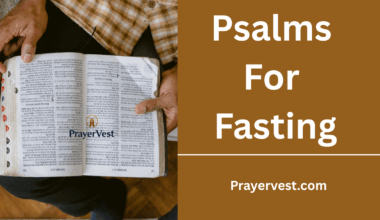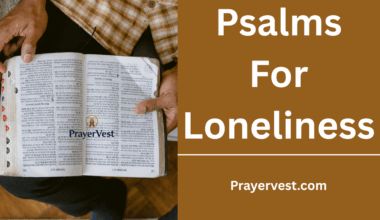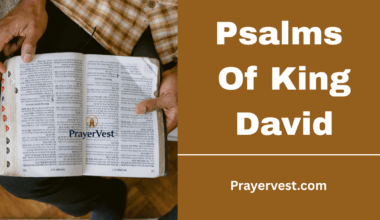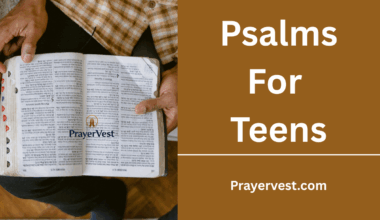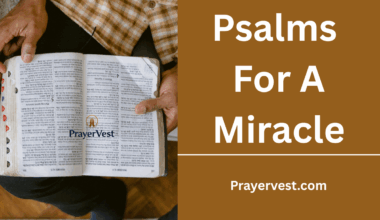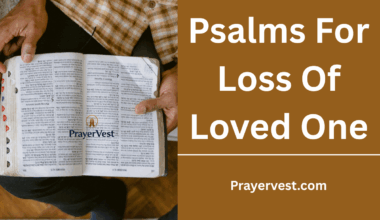A silent thief is worry. It infiltrates our minds, disturbs our tranquility, and intensifies all of our uncertainties. Worry can feel overpowering and unavoidable, whether it stems from marital difficulties, health issues, financial stress, or fear of the future.
The Book of Psalms provides words that reflect our anxieties while gently guiding us back to trust, making them a haven in troubling times. These age-old hymns, penned by individuals who have endured great adversity, communicate candidly, optimistically, and from a heavenly viewpoint to the worried heart.
The Psalms for worry meet us where we are, unlike superficial assurances or fast cures. They raise our gaze above our circumstances to the God who rules over them, rather than ignoring the truth of fear or repressing emotional struggle. The Psalms teach us how to communicate our worries to God through genuine pleas, statements of faith, and poetic screams.
This will not silence or disgrace us, but rather increase our reliance on His goodness and strength. Every verse has a pattern of resting and wrestling, of letting go of our troubles and getting back up with a fresh sense of calm.
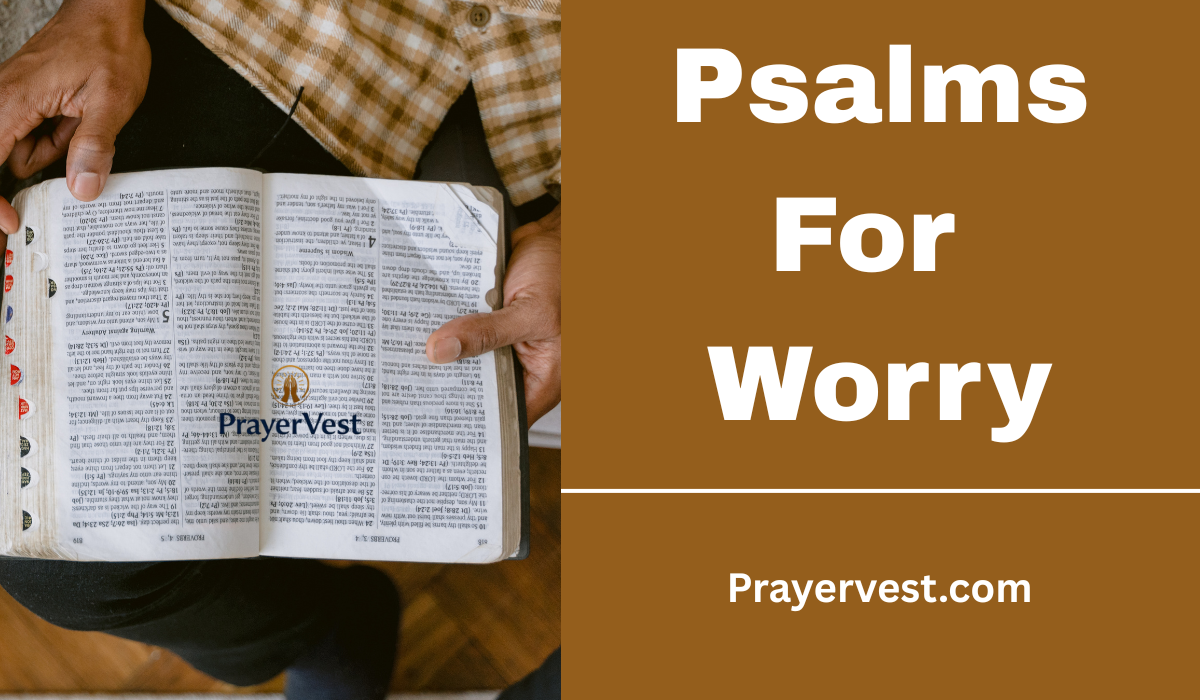

Let the Psalms serve as your guide if concern has taken over your thoughts and emotions. They are more than just consoling; they are an invitation to be in the presence of the One who is in control of your future and who swears to never abandon you. These holy words will serve as a reminder that God is always present, dependable, and in control, even when everything seems uncertain. I pray that every Psalm will replace your anxiety with lasting serenity and your worry with awe.
50 Comforting Psalms For Worry (2026)
1. Psalm 55:22
“Cast your cares on the Lord and he will sustain you; he will never let the righteous be shaken.”
This verse is a direct invitation to hand over our burdens to God. The word “cast” implies a deliberate action of surrender—letting go of what weighs us down and placing it in God’s capable hands. The promise is that God will not only carry our worries but also support us through them. He offers divine stability when everything feels unstable. For the righteous—those who trust in Him—God becomes the foundation that cannot be shaken by the storms of life.
Reflection
When worry consumes us, it often feels like we’re standing on sinking sand. But this verse calls us to make a choice—to cast, not carry. God does not expect us to navigate anxiety alone. In His presence, our concerns lose their power to dominate our minds. What if we practiced giving our stress to God in prayer as often as we picked it up in thought? Trust doesn’t deny the existence of trouble; it redirects its weight onto the One strong enough to bear it.
2. Psalm 94:19
“When anxiety was great within me, your consolation brought me joy.”
This deeply personal verse acknowledges the intensity of inner turmoil while simultaneously testifying to God’s comfort. Anxiety isn’t minimized here—it’s described as “great within me,” showing how overwhelming it can be. Yet, the psalmist finds solace not in circumstances changing, but in God’s presence offering consolation. That comfort doesn’t just neutralize the fear; it brings joy, a deeper assurance that transcends what we feel.
Reflection
Anxiety often arrives uninvited and overstays its welcome. But God’s consolation can be equally strong—soothing, stabilizing, and joyful. Sometimes, comfort doesn’t look like answers—it looks like nearness. When we take our anxious thoughts to the Lord, we don’t always get instant solutions, but we are promised sustaining grace. That’s where joy is found—not in escape from worry, but in being held during it.
3. Psalm 56:3
“When I am afraid, I put my trust in you.”
Fear is not denied or hidden in this verse; it’s acknowledged as a real part of life. But what makes this verse powerful is what follows: an intentional decision to trust God in fear. The psalmist doesn’t wait for fear to disappear before choosing faith. Trust is portrayed as a continual, deliberate action we can take when we’re overwhelmed.
Reflection
Worry often whispers that God won’t come through—but faith answers back with trust. This verse doesn’t tell us to suppress fear, but to meet it with God. Trust doesn’t mean we feel fearless; it means we know where to run when fear comes knocking. Even when emotions rise, our souls can anchor in God’s reliability.
4. Psalm 34:4
“I sought the Lord, and he answered me; he delivered me from all my fears.”
David’s testimony here is both simple and powerful. His response to fear was not paralysis or self-reliance—it was seeking God. And that seeking led to deliverance—not always from situations, but from the grip of fear itself. It is a reminder that when fear feels overwhelming, the act of seeking God actively ushers in peace and assurance.
Reflection
Fear thrives in silence and isolation. But this psalm teaches us to respond with pursuit—to seek the Lord even when we’re unsure how. Prayer becomes the open door through which God’s peace enters. Sometimes, deliverance is not the absence of fear but the presence of God so strong that fear no longer controls us.
5. Psalm 23:4
“Even though I walk through the darkest valley, I will fear no evil, for you are with me; your rod and your staff, they comfort me.”
This well-known verse from Psalm 23 acknowledges the reality of life’s darkest moments—times of fear, uncertainty, and emotional valleys. The promise is not the absence of hardship, but the presence of God within it. His rod and staff—symbols of guidance and protection—offer reassurance that we are not alone, even in our most terrifying experiences.
Reflection
Worry often feels like a lonely journey through shadowed valleys. But Psalm 23 reminds us that God is not a distant observer; He is a present Shepherd. The comfort of His presence turns fear into trust. When you can’t see the light, trust the One who walks beside you. His nearness is not dependent on your strength. He remains faithful in your fear and peace in your panic.
6. Psalm 27:1
“The Lord is my light and my salvation—whom shall I fear? The Lord is the stronghold of my life—of whom shall I be afraid?”
This verse boldly declares God as both light and salvation, directly confronting fear with the truth of who God is. Light dispels darkness, and salvation brings rescue. By describing the Lord as a stronghold—a place of protection and safety—the psalmist offers a powerful counter to the internal chaos that worry creates.
Reflection
Fear often magnifies threats and minimizes God’s power. But this psalm calls us to reverse that: magnify God and shrink your fear. When God is your fortress, fear has no foundation. You may not control the situation, but you can choose your focus. Let your heart cling to the One who lights your path and secures your life.
7. Psalm 37:5
“Commit your way to the Lord; trust in him and he will do this.”
This verse invites a full surrender of our path to God. To “commit your way” means to entrust your plans, decisions, and outcomes to the Lord’s oversight. Worry often stems from trying to control what only God can manage. Trusting Him is not passive—it’s an active handing over of your journey, with the assurance that He will act on your behalf.
Reflection
The weight of worry is often tied to our grip on control. Psalm 37 reminds us that peace begins where surrender starts. When we commit our way to God, we trade anxiety for divine advocacy. Trust isn’t just a feeling—it’s a decision to let God lead, even when the road is unclear. He never fails the heart that relies on Him fully.
8. Psalm 46:1
“God is our refuge and strength, an ever-present help in trouble.”
This verse establishes God not just as a distant rescuer, but as a present refuge—one who is near and accessible when we’re overwhelmed. In the face of trouble, fear, or uncertainty, we’re not left to fend for ourselves. God offers both safety (refuge) and the ability to endure (strength), making Him the ultimate source of stability when worry strikes.
Reflection
Sometimes in our anxious moments, we feel like we’re alone and exposed. But Psalm 46 anchors us in the truth of God’s presence. He is not “someday help”—He is ever-present help. Right now, in your moment of stress, He is your shield and sustainer. Let your soul rest in His unshakable support.
9. Psalm 62:8
“Trust in him at all times, you people; pour out your hearts to him, for God is our refuge.”
This verse is a heartfelt invitation to vulnerability with God. It urges believers to not only trust Him continuously but to “pour out” their hearts to Him. That means releasing everything—fear, anger, sadness, confusion—into His care. God welcomes our honest cries, and He meets them with the safety of His refuge.
Reflection
We often feel we must filter our emotions before coming to God. But Psalm 62 reminds us that He wants all of it—the messy, uncertain, and worried parts of our heart. Your honesty does not intimidate Him; it invites His peace. Pouring out your heart is not weakness—it’s worship in its rawest, most powerful form.
10. Psalm 121:1-2
“I lift up my eyes to the mountains—where does my help come from? My help comes from the Lord, the Maker of heaven and earth.”
This psalm begins with a searching question and ends with a confident answer. In moments of fear or anxiety, we instinctively look for help. This verse redirects our gaze away from earthly fixes to the Creator Himself. The Maker of the heavens and earth is our Helper—mighty enough to move mountains and intimate enough to help us through every worry.
Reflection
Worry turns our eyes inward and downward. But Psalm 121 challenges us to look up—not to the hills, but beyond them. Our help isn’t found in what’s around us, but in Who is above us. The same God who created the universe is actively helping you. So lift your eyes and let hope rise in your heart.
11. Psalm 3:3
“But you, Lord, are a shield around me, my glory, the One who lifts my head high.”
David declares God as a protective shield during one of the darkest times in his life—when he was fleeing from his own son, Absalom. Despite betrayal and fear, he finds solace in God’s protection, glory, and restoring power. The phrase “lifts my head” signifies renewed hope, dignity, and confidence that comes only from God.
Reflection
Worry weighs down the soul, making us feel defeated and defenseless. But God steps into our sorrow as both shield and strength. He doesn’t just defend us; He dignifies us. When life bends your head in fear or shame, the Lord gently lifts it with His love and assurance. You are not forsaken, and your story isn’t over—He is still writing it.
12. Psalm 16:8
“I keep my eyes always on the Lord. With him at my right hand, I will not be shaken.”
This verse is about focus and stability. David intentionally chooses to fix his eyes on God. The result? Unshakeable confidence. “At my right hand” implies closeness and support, like a trusted ally or bodyguard. Amid trouble, David’s gaze isn’t on the problem, but on the Presence.
Reflection
Worry often thrives when our eyes are fixed on problems instead of God. Psalm 16 teaches us the power of spiritual attention. When we fix our gaze on the unmovable God, we become less shaken by life’s turbulence. The storm may rage, but if your anchor is in God, your peace will hold firm.
13. Psalm 9:10
“Those who know your name trust in you, for you, Lord, have never forsaken those who seek you.”
This verse highlights the reliability of God’s character. Knowing His name—His nature, His faithfulness—leads to trust. The promise is anchored in past faithfulness: “You have never forsaken.” It’s a reminder that worry loses its grip when we remember what God has already done.
Reflection
Memory is a weapon against worry. When you recall God’s past faithfulness, it strengthens your present faith. He doesn’t abandon seekers—He embraces them. If your heart is weighed with anxiety, start remembering. Look back to move forward. The God who carried you yesterday still walks with you today.
14. Psalm 28:7
“The Lord is my strength and my shield; my heart trusts in him, and he helps me.”
Here, David gives a personal testimony of God’s help. God is not only a distant protector but an active responder. When David trusts, God acts. Strength is for endurance, and the shield is for protection—two aspects of divine help that soothe a worried heart.
Reflection
Worry often leaves us feeling weak and exposed, but this verse is a declaration of divine backup. Your strength doesn’t come from within—it comes from Him. He shields you from what would harm you and empowers you to endure what remains. Rest in His help; He never fails the heart that trusts Him.
15. Psalm 34:4
“I sought the Lord, and he answered me; he delivered me from all my fears.”
David recounts a time when fear overwhelmed him. His response wasn’t isolation but seeking. The result? God answered and delivered. This verse is a promise wrapped in experience: if we seek, He will act. It’s not just fear that gets addressed—it’s all fears.
Reflection
Fear multiplies in silence, but healing begins with seeking. You don’t need the right words—just a reaching heart. God doesn’t ignore those who cry out; He moves toward them with power and peace. Whatever you’re fearing today, bring it to the God who already holds the outcome.
16. Psalm 55:22
“Cast your cares on the Lord and he will sustain you; he will never let the righteous be shaken.”
This verse is an invitation to unload. “Cast” implies letting go forcefully—throwing your burdens onto God’s capable shoulders. In return, He doesn’t just carry the burden; He sustains you. It’s a divine exchange: your anxiety for His stability.
Reflection
We often try to manage worry by containing it. But God invites us to cast it away—onto Him. He can carry what you were never meant to bear. And as you release your burdens, you’ll discover the sustaining power of His presence. When you let go, you give God space to work.
17. Psalm 94:19
“When anxiety was great within me, your consolation brought me joy.”
This psalm speaks honestly: anxiety can grow large inside us. But God’s consolation—His comfort, presence, and truth—brings not just calm but joy. It reminds us that joy is possible even when anxiety is present, because God is greater than what threatens our peace.
Reflection
Joy may feel impossible when worry fills your mind. But Psalm 94 reminds us that God doesn’t wait until we’re perfect to give us peace. He meets us in our mess. His consolation isn’t shallow—it’s deep, personal, and transforming. You may feel overwhelmed, but His comfort will overflow.
18. Psalm 112:7
“They will have no fear of bad news; their hearts are steadfast, trusting in the Lord.”
This verse describes a person so anchored in trust that they aren’t shaken by bad news. It’s not that difficulties won’t arise, but that their heart remains steady through them. Trust in the Lord creates emotional resilience that outlasts the storm.
Reflection
News—whether good or bad—should not control your peace. Psalm 112 describes a person whose inner world is unshaken because it’s rooted in God. When your security isn’t tied to circumstances, worry loses its power. Let your trust in God train your heart to remain steadfast.
19. Psalm 138:3
“When I called, you answered me; you greatly emboldened me.”
David’s call was met with divine response. And the result was boldness—not just survival, but strength to stand. When worry weakens us, God’s response can inject courage and resolve where fear once lived.
Reflection
Anxiety drains courage, but God restores it. Every time you call, He listens—and He doesn’t just comfort, He empowers. You may feel timid, uncertain, or afraid today, but boldness is waiting in God’s presence. Call on Him, and let His strength replace your fear.
20. Psalm 18:2
“The Lord is my rock, my fortress and my deliverer; my God is my rock, in whom I take refuge.”
David uses powerful imagery to describe God: rock, fortress, deliverer. Each one speaks of stability, safety, and rescue. In times of distress and danger, David doesn’t lean on his strength—he hides in God. This verse teaches us where true security lies.
Reflection
When worry shakes your world, you need a Rock that doesn’t move. God isn’t just a temporary escape—He is a permanent refuge. You can hide in Him without shame. Let your heart lean on the One who never wavers. In His presence, you’ll find protection, peace, and renewed hope.
21. Psalm 27:1
“The Lord is my light and my salvation—whom shall I fear? The Lord is the stronghold of my life—of whom shall I be afraid?”
This powerful declaration arises from David’s deep relationship with God. By calling the Lord his light, salvation, and stronghold, he counters every fearful thought. Light dispels darkness, salvation removes condemnation, and a stronghold provides safety from danger. This verse is a triumphant rebuttal to worry and fear.
Reflection
Fear feeds on uncertainty and the unknown. But when you realize that God is your light, your salvation, and your refuge, fear loses its grip. You’re not walking into darkness alone—God is ahead, beside, and behind you. Declare this verse over your life when anxiety whispers lies. Let faith rise up in the face of fear.
22. Psalm 46:10
“Be still, and know that I am God.”
This short but profound command speaks to hearts in turmoil. “Be still” isn’t about inactivity—it’s about surrender. In the middle of chaos, God calls us to cease striving and remember who He is. Knowing that He is God changes everything.
Reflection
Worry loves noise—mental, emotional, even spiritual noise. But the pathway to peace is paved with stillness. When you stop trying to control everything and start trusting the One who controls all, anxiety begins to lose its power. Let stillness be your sacred weapon against the storms of life.
23. Psalm 62:1
“Truly my soul finds rest in God; my salvation comes from him.”
This verse centers the soul. Rest doesn’t come from fixed circumstances but from a fixed faith in God. When we turn to Him, we find a deeper rest than the world can offer. The rest that comes from salvation is complete and enduring.
Reflection
True rest isn’t the absence of problems but the presence of God. When your soul is tethered to His promises, worry can no longer drag you under. Let your soul exhale. In God, there is rest—not just for your body, but for your heart, mind, and future.
24. Psalm 121:1-2
“I lift up my eyes to the mountains—where does my help come from? My help comes from the Lord, the Maker of heaven and earth.”
The psalmist looks upward, away from his troubles, and finds his answer in God, the Creator. Not only does God help, but He is the Maker of everything. That means your help comes from the One who is sovereign over all your circumstances.
Reflection
When worry blinds you, lift your eyes. Help is not just on the way—it has already come in the form of God’s presence. He made the heavens and the earth, and He can handle your concerns. He doesn’t just observe your struggles—He intervenes with divine authority.
25. Psalm 34:10
“The lions may grow weak and hungry, but those who seek the Lord lack no good thing.”
Even the strongest creatures can go hungry, but God’s people, those who seek Him, are promised provision. This verse is a reminder that seeking God aligns us with divine sufficiency. He knows exactly what we need and when we need it.
Reflection
Worry often stems from fear of lack—lack of money, time, strength, or answers. But this psalm assures us that in God, we lack no good thing. If something is withheld, it’s not because God is unkind, but because He knows what is best. Seek Him, and trust His timing and supply.
26. Psalm 91:1
“Whoever dwells in the shelter of the Most High will rest in the shadow of the Almighty.”
This verse paints a picture of intimacy and security. Dwelling—not visiting—in God’s presence leads to rest. The shadow of the Almighty represents closeness and divine protection. It’s not about a brief reprieve but a lifestyle of refuge.
Reflection
Where you dwell determines your peace. If your mind lives in fear, you’ll always feel unsafe. But if your soul abides in God, you’ll rest in His unshakeable shadow. Make God your home, and worry won’t have space to move in. Rest isn’t something you earn—it’s something you receive when you remain.
27. Psalm 37:25
“I was young and now I am old, yet I have never seen the righteous forsaken or their children begging bread.”
David reflects on a lifetime of watching God’s faithfulness. This verse is testimony—not theory. God doesn’t abandon His people, and He provides not just for them, but for their children. It’s a multigenerational promise of provision.
Reflection
When worry tempts you to doubt God’s provision, look at the track record. He’s never failed those who trust Him. Your needs haven’t caught Him off guard. What you face today is already covered by His faithfulness. Let this verse quiet the panic and remind you—He’s never failed, and He won’t start now.
28. Psalm 103:13-14
“As a father has compassion on his children, so the Lord has compassion on those who fear him; for he knows how we are formed, he remembers that we are dust.”
God’s compassion is grounded in His understanding of our frailty. He knows our limitations and doesn’t expect perfection. Instead, He responds with tender mercy. When you feel weak or overwhelmed, He meets you with empathy, not judgment.
Reflection
Worry often whispers, “You’re not enough.” But God says, “I know you—and I love you anyway.” He doesn’t expect you to be invincible. His compassion is custom-fitted to your humanity. Let His understanding quiet the voice of self-condemnation and invite you into peace.
29. Psalm 33:20-21
“We wait in hope for the Lord; he is our help and our shield. In him our hearts rejoice, for we trust in his holy name.”
This verse joins waiting with hope, shielding with joy, and trusting with rejoicing. Trusting in God’s name—that is, His nature—produces inner strength and outer joy. While we wait for answers, God is already at work shielding us.
Reflection
Worry hates waiting. But faith transforms waiting into worship. Even before the breakthrough, you can rejoice because of who God is. He is your help and your shield—present in the process and the protection. Trust His name. It’s the safest place for your hopes to rest.
30. Psalm 40:1
“I waited patiently for the Lord; he turned to me and heard my cry.”
David tells of a time when he cried out to God and waited with patience. God didn’t ignore him—He turned, He listened, and He responded. This verse offers assurance that God is attentive, even when the wait feels long.
Reflection
In seasons of prolonged worry, it can feel like God is silent. But Psalm 40 reminds you: your voice matters to Him. Every sigh, every tear, every whispered prayer—He hears them all. Keep crying out, keep waiting, and trust that the God who turns His ear toward you will soon turn your situation around.
31. Psalm 4:8
“In peace I will lie down and sleep, for you alone, Lord, make me dwell in safety.”
David writes this at night, affirming that true rest is rooted in God’s protection. It’s not the absence of danger but the presence of divine security that allows peaceful sleep. This verse speaks of a heart that has transferred trust from self to God completely—even in the vulnerability of sleep.
Reflection
Worry is often loudest at night, when distractions are gone and fears have space to speak. But Psalm 4:8 invites you to rest, not because all problems are solved, but because God is in control. Imagine surrendering every anxious thought at the threshold of sleep, knowing your Protector never slumbers. Real peace doesn’t come from circumstances but from confidence in a sovereign, watchful God. Let this verse become your nightly lullaby, a reminder that even when you’re unconscious, God is actively sustaining you.
32. Psalm 94:19
“When anxiety was great within me, your consolation brought me joy.”
This verse acknowledges the reality of anxiety—great and overwhelming—but contrasts it with God’s comfort. The psalmist doesn’t deny his struggle; instead, he testifies to divine consolation as the turning point. God’s presence doesn’t just quiet worry; it replaces it with joy.
Reflection
Anxiety doesn’t disqualify you from God’s presence—it draws you toward it. When your thoughts spiral, God’s comfort interrupts the cycle with divine truth. This verse teaches that you can feel deeply distressed and still be a recipient of heavenly joy. The promise isn’t that anxiety won’t come, but that it won’t win. Let God’s consolations—His promises, His voice, His love—cut through the noise and awaken your heart to joy even amid the storm.
33. Psalm 3:3
“But you, Lord, are a shield around me, my glory, the One who lifts my head high.”
Spoken in a time of betrayal and danger, David affirms God as his shield. He is not only protected but honored, as God lifts his head when it would naturally hang low. This is the image of divine restoration and defense amid crisis.
Reflection
When worry causes you to walk with your head down, let this truth straighten your posture: God is your shield and your glory. He doesn’t just defend you from harm—He restores your dignity. Even in shame, fear, or failure, God gently lifts your head, reminding you that your worth is not tied to your situation but to His unchanging love. Let His presence be the atmosphere that surrounds you like a shield, blocking out the fiery darts of fear and insecurity.
34. Psalm 16:8
“I keep my eyes always on the Lord. With him at my right hand, I will not be shaken.”
The key to unshakable peace lies in focus. David speaks of deliberate attention—keeping his eyes on the Lord. The result is internal stability. When God is at your side, you are not alone, and nothing can destabilize the foundation of your peace.
Reflection
Worry thrives when our eyes are fixed on what we can’t control. But peace grows when our gaze is locked on the One who can never be moved. Your heart may feel weak, but your footing is firm when you’re anchored in Him. Choose each day to shift your eyes away from fear and toward the God who stands by you, unshaken and unshakeable. He is not just near—He is at your right hand, and that means you are never alone.
35. Psalm 9:10
“Those who know your name trust in you, for you, Lord, have never forsaken those who seek you.”
Knowing God’s name—His character—builds trust. This verse ties faith to experience; it is not blind trust, but faith built on God’s flawless track record of never forsaking His people. To seek Him is to be seen by Him, and to be seen is to be sustained.
Reflection
Worry often makes us feel forsaken or invisible, but this verse is a resounding declaration of divine faithfulness. Knowing God’s name means knowing His mercy, His justice, His power, His love. And knowing those things enables trust even when circumstances are unclear. Let your experience of God’s past faithfulness empower your confidence in His present care. He hasn’t forgotten you—He’s holding you.
36. Psalm 13:1
“How long, Lord? Will you forget me forever? How long will you hide your face from me?”
This raw lament expresses the emotional toll of waiting and worry. David feels forgotten, abandoned, and desperate. But even in his pain, he brings his questions to God, showing that God can handle our honesty.
Reflection
Sometimes, worry feels like spiritual abandonment. You wonder if God has turned away or grown silent. But this psalm teaches us that asking “how long?” isn’t faithlessness—it’s the beginning of deeper faith. God invites you to bring your confusion, anger, and despair into His presence. He does not turn away the honest heart. Even when you can’t see His face, you can trust His heart. The silence isn’t absence. Keep talking to Him, and trust that His response is closer than you think.
37. Psalm 25:17
“Relieve the troubles of my heart and free me from my anguish.”
This heartfelt prayer shows that worry and anguish can live in the heart of the faithful. The psalmist cries out not just for circumstantial change, but for internal relief. It is a direct and vulnerable request for emotional deliverance.
Reflection
Sometimes, the most powerful prayers are the simplest: “Help me, God. My heart is heavy.” When anxiety becomes anguish, don’t pretend to be okay. God isn’t looking for polished language—He’s drawn to your need. Cry out like David. Ask for emotional rescue, not just situational change. God is not indifferent to your inner turmoil. He comes close to comfort, to lighten, to free. And that freedom always begins with an honest cry.
38. Psalm 143:4
“So my spirit grows faint within me; my heart within me is dismayed.”
This verse vividly portrays the emotional collapse that worry can cause. The psalmist does not disguise his weakness—he names it. Faint spirit. Dismayed heart. But this admission leads into the next verses where he reaches out to God for help and restoration.
Reflection
You are not alone in your emotional exhaustion. Scripture makes room for weakness. God is not put off by your weariness—He’s moved by it. When your spirit feels faint and your heart is overwhelmed, remember that He is your strength. Don’t hide your frailty—bring it to Him. He is the God who renews, restores, and revives.
39. Psalm 10:17
“You, Lord, hear the desire of the afflicted; you encourage them, and you listen to their cry.”
God is not distant from those in distress. He hears, He encourages, and He listens. This verse is a comforting reminder that affliction doesn’t disqualify you from divine attention—it invites it.
Reflection
Worry often lies and says, “No one hears you.” But the truth is: God hears every desire, every cry, every silent plea. He bends close not just to listen, but to encourage. He’s not a passive observer—He’s an active comforter. Let that reality anchor you when your heart is heavy. You are heard, and you are being helped even when you don’t yet see the answer.
40. Psalm 31:24
“Be strong and take heart, all you who hope in the Lord.”
This verse is a rallying cry for all who wait and worry. Strength and courage are not self-generated—they’re rooted in hope. And hope in the Lord is never in vain. To hope is to hold fast in the face of delay, trusting in God’s goodness and timing.
Reflection
Worry drains courage, but hope renews it. This verse isn’t just encouragement—it’s empowerment. When your hope is in the Lord, you tap into divine strength. Even if you feel weak, you can “take heart” because your future rests in God’s hands. Hope doesn’t ignore reality—it insists on a greater one. Let this verse lift your chin, strengthen your spine, and remind you: as long as your hope is in the Lord, you will never be without reason to press on.
31. Psalm 4:8
“In peace I will lie down and sleep, for you alone, Lord, make me dwell in safety.”
David writes this at night, affirming that true rest is rooted in God’s protection. It’s not the absence of danger but the presence of divine security that allows peaceful sleep. This verse speaks of a heart that has transferred trust from self to God completely—even in the vulnerability of sleep.
Reflection
Worry is often loudest at night, when distractions are gone and fears have space to speak. But Psalm 4:8 invites you to rest, not because all problems are solved, but because God is in control. Imagine surrendering every anxious thought at the threshold of sleep, knowing your Protector never slumbers. Real peace doesn’t come from circumstances but from confidence in a sovereign, watchful God. Let this verse become your nightly lullaby, a reminder that even when you’re unconscious, God is actively sustaining you.
32. Psalm 94:19
“When anxiety was great within me, your consolation brought me joy.”
This verse acknowledges the reality of anxiety—great and overwhelming—but contrasts it with God’s comfort. The psalmist doesn’t deny his struggle; instead, he testifies to divine consolation as the turning point. God’s presence doesn’t just quiet worry; it replaces it with joy.
Reflection
Anxiety doesn’t disqualify you from God’s presence—it draws you toward it. When your thoughts spiral, God’s comfort interrupts the cycle with divine truth. This verse teaches that you can feel deeply distressed and still be a recipient of heavenly joy. The promise isn’t that anxiety won’t come, but that it won’t win. Let God’s consolations—His promises, His voice, His love—cut through the noise and awaken your heart to joy even amid the storm.
33. Psalm 3:3
“But you, Lord, are a shield around me, my glory, the One who lifts my head high.”
Spoken in a time of betrayal and danger, David affirms God as his shield. He is not only protected but honored, as God lifts his head when it would naturally hang low. This is the image of divine restoration and defense amid crisis.
Reflection
When worry causes you to walk with your head down, let this truth straighten your posture: God is your shield and your glory. He doesn’t just defend you from harm—He restores your dignity. Even in shame, fear, or failure, God gently lifts your head, reminding you that your worth is not tied to your situation but to His unchanging love. Let His presence be the atmosphere that surrounds you like a shield, blocking out the fiery darts of fear and insecurity.
34. Psalm 16:8
“I keep my eyes always on the Lord. With him at my right hand, I will not be shaken.”
The key to unshakable peace lies in focus. David speaks of deliberate attention—keeping his eyes on the Lord. The result is internal stability. When God is at your side, you are not alone, and nothing can destabilize the foundation of your peace.
Reflection
Worry thrives when our eyes are fixed on what we can’t control. But peace grows when our gaze is locked on the One who can never be moved. Your heart may feel weak, but your footing is firm when you’re anchored in Him. Choose each day to shift your eyes away from fear and toward the God who stands by you, unshaken and unshakeable. He is not just near—He is at your right hand, and that means you are never alone.
35. Psalm 9:10
“Those who know your name trust in you, for you, Lord, have never forsaken those who seek you.”
Knowing God’s name—His character—builds trust. This verse ties faith to experience; it is not blind trust, but faith built on God’s flawless track record of never forsaking His people. To seek Him is to be seen by Him, and to be seen is to be sustained.
Reflection
Worry often makes us feel forsaken or invisible, but this verse is a resounding declaration of divine faithfulness. Knowing God’s name means knowing His mercy, His justice, His power, His love. And knowing those things enables trust even when circumstances are unclear. Let your experience of God’s past faithfulness empower your confidence in His present care. He hasn’t forgotten you—He’s holding you.
36. Psalm 13:1
“How long, Lord? Will you forget me forever? How long will you hide your face from me?”
This raw lament expresses the emotional toll of waiting and worry. David feels forgotten, abandoned, and desperate. But even in his pain, he brings his questions to God, showing that God can handle our honesty.
Reflection
Sometimes, worry feels like spiritual abandonment. You wonder if God has turned away or grown silent. But this psalm teaches us that asking “how long?” isn’t faithlessness—it’s the beginning of deeper faith. God invites you to bring your confusion, anger, and despair into His presence. He does not turn away the honest heart. Even when you can’t see His face, you can trust His heart. The silence isn’t absence. Keep talking to Him, and trust that His response is closer than you think.
37. Psalm 25:17
“Relieve the troubles of my heart and free me from my anguish.”
This heartfelt prayer shows that worry and anguish can live in the heart of the faithful. The psalmist cries out not just for circumstantial change, but for internal relief. It is a direct and vulnerable request for emotional deliverance.
Reflection
Sometimes, the most powerful prayers are the simplest: “Help me, God. My heart is heavy.” When anxiety becomes anguish, don’t pretend to be okay. God isn’t looking for polished language—He’s drawn to your need. Cry out like David. Ask for emotional rescue, not just situational change. God is not indifferent to your inner turmoil. He comes close to comfort, to lighten, to free. And that freedom always begins with an honest cry.
38. Psalm 143:4
“So my spirit grows faint within me; my heart within me is dismayed.”
This verse vividly portrays the emotional collapse that worry can cause. The psalmist does not disguise his weakness—he names it. Faint spirit. Dismayed heart. But this admission leads into the next verses where he reaches out to God for help and restoration.
Reflection
You are not alone in your emotional exhaustion. Scripture makes room for weakness. God is not put off by your weariness—He’s moved by it. When your spirit feels faint and your heart is overwhelmed, remember that He is your strength. Don’t hide your frailty—bring it to Him. He is the God who renews, restores, and revives.
39. Psalm 10:17
“You, Lord, hear the desire of the afflicted; you encourage them, and you listen to their cry.”
God is not distant from those in distress. He hears, He encourages, and He listens. This verse is a comforting reminder that affliction doesn’t disqualify you from divine attention—it invites it.
Reflection
Worry often lies and says, “No one hears you.” But the truth is: God hears every desire, every cry, every silent plea. He bends close not just to listen, but to encourage. He’s not a passive observer—He’s an active comforter. Let that reality anchor you when your heart is heavy. You are heard, and you are being helped even when you don’t yet see the answer.
40. Psalm 31:24
“Be strong and take heart, all you who hope in the Lord.”
This verse is a rallying cry for all who wait and worry. Strength and courage are not self-generated—they’re rooted in hope. And hope in the Lord is never in vain. To hope is to hold fast in the face of delay, trusting in God’s goodness and timing.
Reflection
Worry drains courage, but hope renews it. This verse isn’t just encouragement—it’s empowerment. When your hope is in the Lord, you tap into divine strength. Even if you feel weak, you can “take heart” because your future rests in God’s hands. Hope doesn’t ignore reality—it insists on a greater one. Let this verse lift your chin, strengthen your spine, and remind you: as long as your hope is in the Lord, you will never be without reason to press on.
Conclusion
Although worry is a natural aspect of being human, it need not define us. The Psalms teach us to firmly ground our souls in God’s unfailing love and sovereignty while confronting our concerns head-on. They tell us that as long as we give all to the One who hears, consoles, and provides, it’s acceptable to let our nervous thoughts run wild, struggle with uncertainty, and even scream out in desperation. The Psalms serve as a reminder that God is not only conscious of our troubles, but also actively willing to bear them with us throughout any time of anxiety or uncertainty.
Let these texts become more than just beautiful words as you think about them; let them become spiritual lifelines, prayers, and declarations. Even while worry may still be there, you can respond to it calmly rather than frantically if you are armed with the knowledge of Scripture and the conviction that God is close. I pray that the Psalms may help you get closer to the One who breathes peace over your soul and soothes every storm. Allow your concern to catalyze a deeper search for Him, where you will discover the rest you so desperately need.

